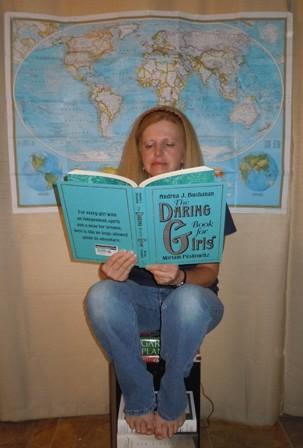Cheryl Hughes: Bygones
Sometimes, I forget that my dad was ever a little boy. Sometimes, when I’m angry about the past, and wanting to blame somebody for the present, I don’t want to remember that my dad was a little boy.
But sometimes, like this past Saturday evening, at my dad’s eighty-fourth birthday party, I come face to face with the little boy he was, and there is no denying him. Dad tells the story of his first axe. He is seven years old and barefoot, running to meet the postman. Aunt Mat (Martha Mercer, his great grandmother) has ordered a small axe for him. It is the early thirties, and Martha receives a monthly “old folks’ pension” of ten dollars. She has noticed that the boy likes to try to cut down small trees using man-sized tools, with less than satisfactory results. She decides that part of her pension would be well spent helping out her grandson. She has no way of knowing that he will someday make his living by cutting down and sawing timber. It is an unforgettable day when the axe arrives. “It seems like it was yesterday,” my eighty-four year old father says.
For a brief time, there was a picture of my dad as a ten-year-old hanging on the wall of my parents’ house. Dad has his shoulders raised in what appears to be a shrug, his head is tucked down. Although he wears a big smile, you can see shyness in his eyes. The picture is heart breaking, a boy with no identifiable hope, hoping anyway. The time frame is the Great Depression.
Dad’s stories of the Great Depression are told with a matter-of-factness that reveals more about the toughness of the people than the toughness of the times. “We had just moved into that house in Kingswood, and I noticed that big hole in the wall before I went to bed, so when that rat bit me on the neck, I jumped out of bed and blocked that hole and killed that rat before he could bite me again.” Dad laughs as he finishes the story. I’m still back there at the rat biting his neck, and I wonder how he came out of that place to this place, laughing as he tells the story.
When Dad talks about his father, he is all admiration: His dad fishing with a bow and arrow, carrying the mail across a tree thrown over the creek where the bridge has washed out, taking down nearly a covey of quail and cursing when one bird escapes his aim. The man my dad is often says he is this man because of the man his dad was. I find it unbelievable that my dad has the kind of admiration he does for his father, because that same man walked off and left his family in the middle of the Great Depression.
About ten years ago, one of my cousins decided to try to locate my grandfather. She did. He was deceased by that time. He had moved out of state and changed his name. He had a whole other family who had no knowledge of Dad or his siblings. Dad’s younger brother was furious with his father. He told my dad that he had believed all this time that their father was dead or in prison or in some other situation that prevented him from contacting his children. My uncle couldn’t deal with the idea that his dad chose to completely abandon his family. He told my dad that he could never forgive their father.
I will never forget what Dad said to his brother. “We made it because of him. We are like we are because he was like he was. Look at us. You became a boat captain. I became a county judge. That belief that we could do anything, that came from him.”
There is a verse in Jeremiah where God says to the prophet,“…if you extract the precious from the worthless, you will become my spokesman.”
I wonder if I’ll ever get there. Somehow, Dad did.
- Log in to post comments



























